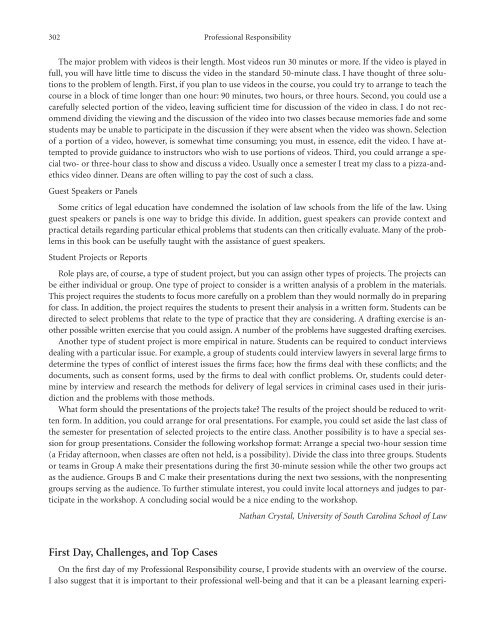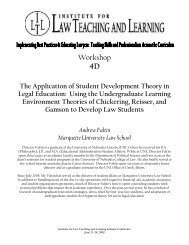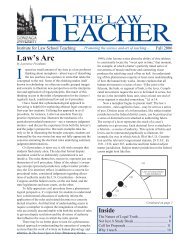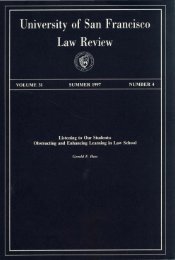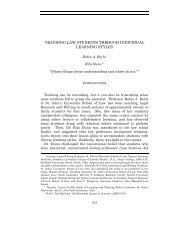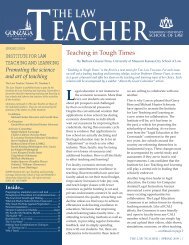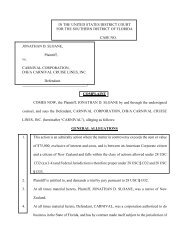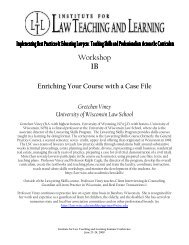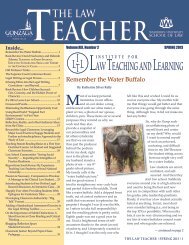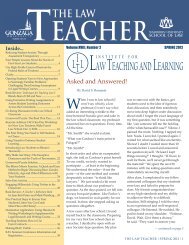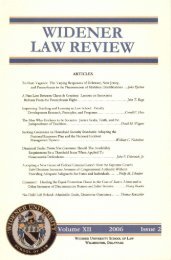Teaching the Law School Curriculum - Institute for Law Teaching ...
Teaching the Law School Curriculum - Institute for Law Teaching ...
Teaching the Law School Curriculum - Institute for Law Teaching ...
You also want an ePaper? Increase the reach of your titles
YUMPU automatically turns print PDFs into web optimized ePapers that Google loves.
302 Professional Responsibility<br />
The major problem with videos is <strong>the</strong>ir length. Most videos run 30 minutes or more. If <strong>the</strong> video is played in<br />
full, you will have little time to discuss <strong>the</strong> video in <strong>the</strong> standard 50-minute class. I have thought of three solutions<br />
to <strong>the</strong> problem of length. First, if you plan to use videos in <strong>the</strong> course, you could try to arrange to teach <strong>the</strong><br />
course in a block of time longer than one hour: 90 minutes, two hours, or three hours. Second, you could use a<br />
carefully selected portion of <strong>the</strong> video, leaving sufficient time <strong>for</strong> discussion of <strong>the</strong> video in class. I do not recommend<br />
dividing <strong>the</strong> viewing and <strong>the</strong> discussion of <strong>the</strong> video into two classes because memories fade and some<br />
students may be unable to participate in <strong>the</strong> discussion if <strong>the</strong>y were absent when <strong>the</strong> video was shown. Selection<br />
of a portion of a video, however, is somewhat time consuming; you must, in essence, edit <strong>the</strong> video. I have attempted<br />
to provide guidance to instructors who wish to use portions of videos. Third, you could arrange a special<br />
two- or three-hour class to show and discuss a video. Usually once a semester I treat my class to a pizza-andethics<br />
video dinner. Deans are often willing to pay <strong>the</strong> cost of such a class.<br />
Guest Speakers or Panels<br />
Some critics of legal education have condemned <strong>the</strong> isolation of law schools from <strong>the</strong> life of <strong>the</strong> law. Using<br />
guest speakers or panels is one way to bridge this divide. In addition, guest speakers can provide context and<br />
practical details regarding particular ethical problems that students can <strong>the</strong>n critically evaluate. Many of <strong>the</strong> problems<br />
in this book can be usefully taught with <strong>the</strong> assistance of guest speakers.<br />
Student Projects or Reports<br />
Role plays are, of course, a type of student project, but you can assign o<strong>the</strong>r types of projects. The projects can<br />
be ei<strong>the</strong>r individual or group. One type of project to consider is a written analysis of a problem in <strong>the</strong> materials.<br />
This project requires <strong>the</strong> students to focus more carefully on a problem than <strong>the</strong>y would normally do in preparing<br />
<strong>for</strong> class. In addition, <strong>the</strong> project requires <strong>the</strong> students to present <strong>the</strong>ir analysis in a written <strong>for</strong>m. Students can be<br />
directed to select problems that relate to <strong>the</strong> type of practice that <strong>the</strong>y are considering. A drafting exercise is ano<strong>the</strong>r<br />
possible written exercise that you could assign. A number of <strong>the</strong> problems have suggested drafting exercises.<br />
Ano<strong>the</strong>r type of student project is more empirical in nature. Students can be required to conduct interviews<br />
dealing with a particular issue. For example, a group of students could interview lawyers in several large firms to<br />
determine <strong>the</strong> types of conflict of interest issues <strong>the</strong> firms face; how <strong>the</strong> firms deal with <strong>the</strong>se conflicts; and <strong>the</strong><br />
documents, such as consent <strong>for</strong>ms, used by <strong>the</strong> firms to deal with conflict problems. Or, students could determine<br />
by interview and research <strong>the</strong> methods <strong>for</strong> delivery of legal services in criminal cases used in <strong>the</strong>ir jurisdiction<br />
and <strong>the</strong> problems with those methods.<br />
What <strong>for</strong>m should <strong>the</strong> presentations of <strong>the</strong> projects take? The results of <strong>the</strong> project should be reduced to written<br />
<strong>for</strong>m. In addition, you could arrange <strong>for</strong> oral presentations. For example, you could set aside <strong>the</strong> last class of<br />
<strong>the</strong> semester <strong>for</strong> presentation of selected projects to <strong>the</strong> entire class. Ano<strong>the</strong>r possibility is to have a special session<br />
<strong>for</strong> group presentations. Consider <strong>the</strong> following workshop <strong>for</strong>mat: Arrange a special two-hour session time<br />
(a Friday afternoon, when classes are often not held, is a possibility). Divide <strong>the</strong> class into three groups. Students<br />
or teams in Group A make <strong>the</strong>ir presentations during <strong>the</strong> first 30-minute session while <strong>the</strong> o<strong>the</strong>r two groups act<br />
as <strong>the</strong> audience. Groups B and C make <strong>the</strong>ir presentations during <strong>the</strong> next two sessions, with <strong>the</strong> nonpresenting<br />
groups serving as <strong>the</strong> audience. To fur<strong>the</strong>r stimulate interest, you could invite local attorneys and judges to participate<br />
in <strong>the</strong> workshop. A concluding social would be a nice ending to <strong>the</strong> workshop.<br />
First Day, Challenges, and Top Cases<br />
Nathan Crystal, University of South Carolina <strong>School</strong> of <strong>Law</strong><br />
On <strong>the</strong> first day of my Professional Responsibility course, I provide students with an overview of <strong>the</strong> course.<br />
I also suggest that it is important to <strong>the</strong>ir professional well-being and that it can be a pleasant learning experi-


